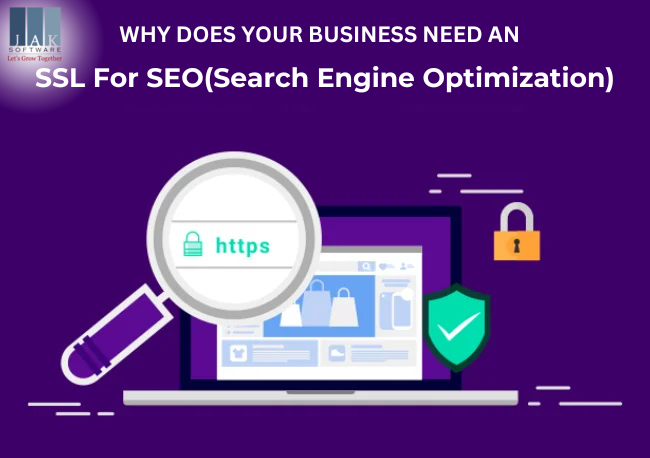As we move further into 2025, the importance of website security has never been more paramount. One of the most vital components of a secure website is SSL (Secure Socket Layer), a technology that encrypts the connection between a user’s browser and the website they are visiting. While SSL has long been a standard for securing websites, its impact on SEO and user trust is more significant than ever. In this article, we’ll explore why SSL is crucial for both SEO and user trust in 2025 and how its presence can enhance your Google digital marketing & strategy
What is SSL and How Does It Work?
SSL (Secure Socket Layer) is a protocol that encrypts data exchanged between a user’s browser and the server hosting the website. When a website has an SSL certificate, its URL will start with “https://” rather than “http://”. This shows that all data transferred is encrypted, protecting sensitive information such as passwords, personal details, and credit card numbers from hackers and malicious entities.
The SSL certificate involves a key exchange mechanism, which ensures that only the intended recipient can decrypt and read the data. This encryption keeps users’ interactions with the website secure from third parties.
SSL’s Role in SEO: Why Google Prioritizes It
In 2025, SSL isn’t just an added security feature—it’s a key ranking factor for search engines, particularly Google. Google has long emphasized website security, and SSL plays a vital role in its algorithm. Here’s why:
Google’s Ranking Algorithm Rewards Secure Sites
Google confirmed years ago that HTTPS is a ranking signal, meaning websites with SSL certificates are more likely to rank higher than those without. Google aims to provide users with the most secure and reliable search results, and SSL encryption is a key part of that effort.
With the introduction of mobile-first indexing and the increasing importance of site security, HTTPS continues to become even more significant in search rankings. As part of its commitment to ensuring secure browsing for users, Google pushes websites without SSL certificates further down the rankings, urging website owners to adopt HTTPS to maintain visibility in search results.
HTTPS Websites Are More Likely to Be Crawled Efficiently
Search engine bots need to crawl and index a website’s pages to understand its content. Googlebot, which is responsible for indexing pages for Google, prioritizes web development agency that uses HTTPS because they are deemed more trustworthy and secure. SSL certificates smooth and streamline the crawling process, ensuring that search engines index your site properly.
SSL Enhances Core Web Vitals and User Experience
As Google focuses more on Core Web Vitals (a set of metrics that measure real-world user experience), website performance and security become key factors in SEO rankings.SSL enhances the overall user experience by encrypting website traffic, preventing potential interruptions or security risks. Google rewards websites that provide a fast, secure, and smooth experience, and SSL helps contribute to this.
SSL and User Trust: Building a Secure Experience
Beyond SEO benefits, SSL certificates play a critical role in cultivating user trust—an essential factor for conversion rates and customer loyalty.
Users Are Increasingly Aware of Security
In 2025, users will be more aware of internet security threats than ever before. With news stories about data breaches and cyberattacks filling headlines, users expect the websites they visit to provide a secure experience. Browsers like Chrome and Firefox now clearly display a “Not Secure” warning for sites without SSL. This stark warning can deter visitors, as users tend to avoid sites that seem unsafe.
SSL shows visitors that your site is a safe place to interact. When users spot the green padlock icon and “https://” in their browser’s address bar, they recognize that their data is encrypted and secure. This builds trust and encourages them to stay on your site, complete a purchase, or submit their information. This fosters trust and makes them more likely to stay on your site, complete a purchase, or submit their information.
Improved User Confidence Leads to Higher Conversions
Websites with SSL certificates have a higher likelihood of converting visitors into customers. When users feel confident that they protect their data, they are more likely to complete a purchase or fill out a contact form. This can directly impact your conversion rate—an essential metric for e-commerce sites and businesses that rely on lead generation.
SSL also makes it easier for businesses to collect valuable data from users, knowing it is safe. This ensures that users feel comfortable providing personal details, which benefits businesses seeking to build trust and loyalty.
Protection Against Phishing Attacks
Phishing is a common attack where fraudulent websites attempt to mimic legitimate ones to steal personal information. An SSL certificate protects against phishing by ensuring that the website you are visiting is authentic and secure. When users see that the website has a valid SSL certificate, they are more likely to trust it and less likely to fall victim to phishing scams.
The Growing Need for SSL in 2025
The demand for robust online security grows as the digital landscape continues to evolve. Cybercrime is a rapidly increasing threat, and businesses must take proactive steps to protect their websites and customers. SSL is no longer an optional security feature—it’s a necessity.
With privacy concerns at an all-time high, particularly with new laws and regulations like GDPR (General Data Protection Regulation) and CCPA (California Consumer Privacy Act), SSL is essential to ensure compliance with data protection standards. For eCommerce website design, SSL is especially crucial because it safeguards sensitive customer data, such as payment information and personal details, preventing it from being intercepted or stolen. Implementing SSL on an eCommerce site not only ensures regulatory compliance but also fosters customer trust, essential for driving conversions and securing sensitive transactions.
How to Get SSL and Ensure It’s Working Properly
Getting an SSL certificate is relatively easy and affordable, especially with many hosting providers offering it as a free service. Some website platforms, like WordPress, also provide SSL integration options with just a few clicks. However, you properly install and configure the certificate to avoid issues like mixed content warnings, which occur when some resources on a page aren’t securely loaded over HTTPS.
To verify your SSL for SEO, check for the green padlock in the address bar or use online tools like SSL Labs to check the status of your certificate and ensure it’s working correctly.
Conclusion
In 2025, SSL isn’t just about securing your website—it’s about improving your SEO strategy, enhancing user trust, and ensuring your site’s long-term success. Websites with SSL certificates are more likely to rank higher, offer a better user experience, and convert visitors into loyal customers. As internet security concerns continue to rise, investing in an SSL certificate is one of the most important steps you can take to future-proof your website and stay ahead of your competition.
If you haven’t yet implemented SSL on your website, now is the time to act. By doing so, you’ll protect your users, boost your SEO, and foster greater trust—making your website a safer, more reliable destination for visitors in 2025.




